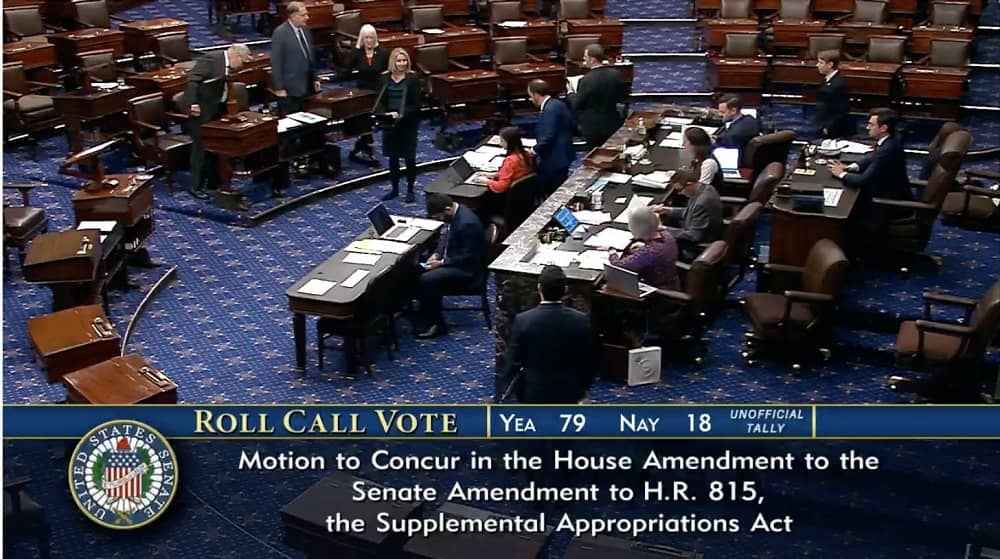

The bill, receiving overwhelming bipartisan support with a vote of 79-18, is now awaiting President Joe Biden’s signature.
This legislative move expands the scope of sanctions against Iran’s crucial oil sector, specifically targeting entities involved in shipping and processing Iranian crude oil in defiance of existing U.S. sanctions. It extends to foreign ports, vessels, and refineries, marking a stringent approach to enforce compliance.
The bill introduces the ‘Stop Harboring Iranian Petroleum Act’ or the ‘SHIP Act,’ designed to cut down Tehran’s income from oil, which is notoriously channeled into funding regional terrorist operations. Additionally, the ‘Fight and Combat Rampant Iranian Missile Exports Act,’ known as the ‘Fight CRIME Act,’ addresses Iran’s missile and drone proliferation that continues to pose threats to regional stability.
U.S. House of Representatives Passes Comprehensive Bills Targeting Iran’s Regime https://t.co/WGrfDX6YWR
If the H.R.8038 – 21st Century Peace through Strength Act and its six amendments targeting the Iranian regime – are ratified by the Senate and signed into law by the…— NCRI-U.S. Rep Office (@NCRIUS) April 21, 2024
One of the standout elements of the package is the ‘Mahsa Amini Human Rights and Security Accountability Act,’ or ‘MAHSA Act.’ This act is particularly timely, named after Mahsa Amini, whose death in Iranian custody sparked global outrage and highlighted the regime’s oppressive practices. It targets top officials, including Supreme Leader Ali Khamenei and President Ebrahim Raisi, imposing sanctions for their roles in human rights abuses and terrorism support.
Further, the ‘No Technology for Terror Act’ reinforces existing restrictions on the export of American technology used in drone and missile development, crucial to Tehran’s military enhancements.
U.S. Senate PASSES foreign aid package, 79-18.
Goes now to the president. pic.twitter.com/2idYrn6Itt
— CSPAN (@cspan) April 24, 2024
The package also includes the ‘Holding Iranian Leaders Accountable Act,’ which aims to increase transparency concerning the financial activities of Iranian leaders, further isolating them from the global financial system. Moreover, the ‘Iran-China Energy Sanctions Act of 2023’ hits at the heart of Iran’s economic interactions, penalizing foreign financial institutions involved in significant transactions with Iran’s energy sector.
This robust legislative action underscores a significant U.S. commitment to addressing the multifaceted challenges posed by Tehran, from its nuclear ambitions to its regional destabilizing activities. The passage of this bill reflects a strategic shift in U.S. policy, aiming not only to punish but also to prevent further destabilizing actions by Iran.
The foreign aid bill, which includes six bills that directly oppose the Iranian regime, was just passed in the Senate (79-18) after it passed the House last week and is now sent to the President to be signed into law.
These provisions call for stringent sanctions and other… pic.twitter.com/wDakBBWXRy— Alireza Jafarzadeh (@A_Jafarzadeh) April 24, 2024
As this comprehensive sanctions package moves to President Biden for his signature, it stands as a testament to the U.S. resolve to hold the Iranian regime accountable, demonstrating a clear commitment from the international community against terrorism and human rights abuses.

MEK Iran (follow us on Twitter and Facebook), Maryam Rajavi’s on her site, Twitter & Facebook, NCRI (Twitter & Facebook), and People’s Mojahedin Organization of Iran – MEK IRAN – YouTu







